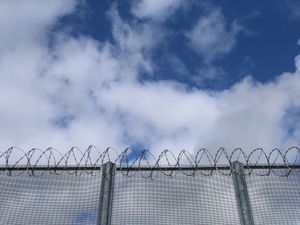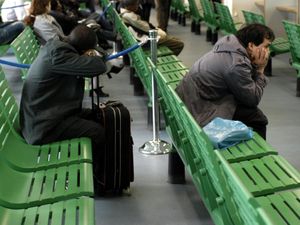Prison officers’ union warns of legal action if overcrowding ‘crisis’ worsens
The POA fears jails in England and Wales could be full by June.

The prison officers’ union has warned it could take the Government to court if the overcrowding “crisis” in jails gets worse.
The POA fears prisons could be full by June and said it may launch a legal challenge under health and safety laws if safe capacity levels are breached because guards have “no right to strike” in England and Wales.
The warning comes as union bosses were set to meet Justice Secretary Alex Chalk and prisons minister Edward Argar on Friday afternoon to discuss what extra urgent measures could be taken to ease the pressure.
The POA’s general secretary Steve Gillan told the PA news agency the entire criminal justice system was in “meltdown”, adding: “We are in crisis, we are not prepared to jeopardise the health and safety of our members by doubling up and trebling up in cells just to cram people in.
“Come June, I think our prisons will be full up and there’ll be no flexibility at all.”
Indicating fears of a tussle between civil servants and political leaders on the matter, he said Prison Service officials had “made their position clear to us as a trade union, that they’re not prepared for Government ministers to approve that either”.
“We have been warning against this for several years. Make no mistake we support HM Prison and Probation Service (HMPPS) leadership and will take any action necessary to protect our members in any attempt to further overcrowd our prisons under health and safety legislation and indeed legal action”, he added.
National chairman Mark Fairhurst said safety of staff was “paramount” and the POA would “not allow the powers that be to breach safe operational capacity levels under any circumstances”.
“We fully support the leaders of HMPPS in their continued stance against breaching operational capacity levels and we will seek legal redress if there is any attempt to replace them or overrule them. For the safety of all POA members working in prisons we will react accordingly to protect their health and safety if any breach is proposed”.
As of Friday, the prison population stood at 87,089 with a “usable operational capacity” of 89,014, indicating almost 2,000 spaces are available.
This does not include around 1,350 cell spaces which are always kept free as a contingency measure so prisons have the capacity to operate safely and respond to any unforeseen circumstances.
The Government expanded a scheme on Thursday so some inmates could be released from jail up to 70 days early in a bid to free up prison cells, but concerns have been raised that dangerous criminals could end up being eligible. Officials have stressed that offenders will continue to be supervised under strict conditions.
And earlier this week, ministers insisted no arrests have been delayed after it emerged police forces in England and Wales were told to take fewer suspects into custody amid prison overcrowding.
Chief constables were also being urged by the National Police Chiefs Council (NPCC) to consider pausing “any planned operations where large numbers of arrests may take place” to ease pressure on the criminal justice system.
The request, which crime and policing minister Chris Philp told MPs was a contingency measure, prompted a backlash amid concerns over public safety if the measures were put into action.
Deputy Metropolitan Police Commissioner Dame Lynne Owens rejected the request, saying the force “will never agree to pausing any necessary arrests” while chairwoman of the Police and Crime Commissioners Association Donna Jones said not arresting suspected criminals “will have consequences, it is not a position I can support”.
Mr Gillan said police leaders “quite rightly should be resistant to that”, but added: “We have a perfect storm and due to a lack of capacity in our prisons, it’s having a knock on effect with the police, the courts and probation service.
“The focus of attention now won’t be on the criminal justice system, it will be on who’s going to win this General Election and everything else is getting forgotten about.”
In a report published on Friday, Whitehall’s spending watchdog found overcrowding in prisons is now “one of the biggest obstacles” to cutting the courts backlog.
The Government’s target of cutting the crown court backlog to 53,000 by March 2025 is “no longer achievable”, the National Audit Office (NAO) said.
More than a quarter of cases are waiting for a year or more to be heard, “prolonging the distress to victims” waiting for justice, according to the findings, meanwhile there have been reports of some trials due to take place this week being adjourned until 2026.
The Ministry of Justice is building six new prisons in a bid to create an extra 20,000 places as demand grows for cell spaces partially because of the Government’s recruitment campaign to hire 20,000 more police officers. Around 6,000 spaces have been created already and around 10,000 are due to be built by the end of 2025.
The Conservative Party has been contacted for comment.





